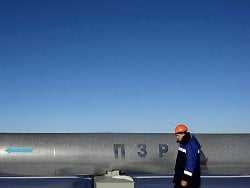“In the Midst of an Energy War”
Experts warn of rising gas prices
2/23/2022 4:54 am
Germany is dependent on Russian gas supplies. But because of the Ukraine crisis, the partnership is being put to the test. Experts anticipate rising costs for consumers.
An escalation in the Ukraine crisis could lead to rising gas prices. Possible sanctions against Russia in the energy sector would in any case also affect European consumers, said Timm Kehler, head of the industry association Zukunft Gas, the dpa. Price increases would be passed on to consumers with a delay by means of long-term contracts.
The energy expert Claudia Kemfert from the German Institute for Economic Research told the dpa: “There is no question that we are in a very serious situation, even in the midst of a fossil energy war.” The energy transition must be pushed in order to get away from all fossil energies as far as possible. “Gas prices have already risen due to the difficult situation and further price increases are now more likely,” said Kemfert. “We are currently paying the price for the delayed energy transition.”
After Russian recognition of the self-proclaimed People’s Republics of Luhansk and Donetsk in eastern Ukraine, the EU Commission is planning measures against Russia in the financial sector. Sanctions, for example, against the Russian energy sector have been prepared in case Russia launches an attack on all of Ukraine.
Kerstin Andreae, head of the Federal Association of Energy and Water Industries, told the dpa: “If deliveries from Russia fail from one day to the next, that is a major challenge that the federal government and the energy industry would then face. But we have in Europe security mechanisms that then take effect. In any case, household customers and various facilities are particularly protected by legal provisions. Contractually regulated switch-off agreements with industry or the switch to other energy sources would also curb the demand for gas.”
“The situation would be difficult, but it can be mastered”
Germany also gets natural gas from other supplier countries, says Andreae. “There is also the possibility of obtaining additional quantities of liquid gas to a certain extent, for example from the USA. One would check: What alternatives are there? Where are there still quantities in storage? Who could supply additional quantities? Where can reductions be made? In addition, Germany is not an island, but part of a European natural gas supply system in which the EU countries support each other if necessary.” There are corresponding binding precautionary plans for this.
“Current calculations by the federal government show that Germany will probably get through the winter even if Russia were to completely stop its natural gas supplies. The situation would be difficult, but it can be mastered.” Kehler said: “We are observing the situation in Ukraine with great concern. We hope that diplomacy will still be successful and that there will be no armed conflict.” Europe is dependent on energy imports. It is now all the more important to continue to think about diversifying the gas supply and to press ahead with the construction of a German LNG terminal.
50 percent of gas supplies from Russia
Kemfert said Germany is very dependent on Russian gas supplies. More than 50 percent of gas supplies come from Russia. With the commissioning of Nord Stream 2, the share would increase significantly to almost 70 percent. “It’s actually too strong a dependency, a dangerous one too.” In the short term, Germany could also obtain some of the possible gas supplies from other sources. “In addition, we are currently at the end of winter.” What it will be like next winter depends crucially on whether it is possible to set up a strategic gas reserve, for example.
The industry association of storage companies, the Energy Storage Initiative (INES), assumes that the German gas supply could survive a failure of all Russian gas imports in the coming days and weeks. The condition is that the temperatures remain mild and that sufficient liquefied natural gas (LNG) is available for the EU internal market, said Sebastian Bleschke, Managing Director of the association.
“Since such a situation has not yet occurred in the past, a certain degree of uncertainty remains.” The storage levels in Germany were around 31 percent last Sunday. “The levels are therefore still very low, but no longer historically low.”
